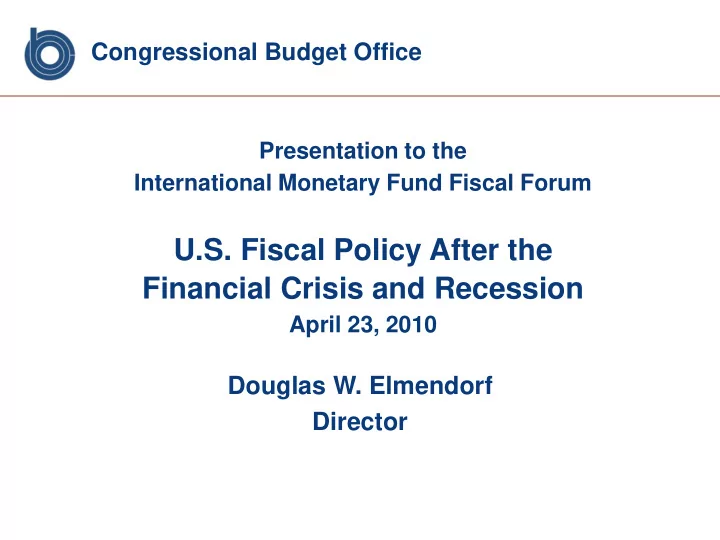

Congressional Budget Office Presentation to the International Monetary Fund Fiscal Forum U.S. Fiscal Policy After the Financial Crisis and Recession April 23, 2010 Douglas W. Elmendorf Director
Key Lessons for U.S. Fiscal Policy from the Recent Experience Stronger automatic stabilizers probably would have reduced the output and employment losses from the financial crisis, especially because monetary policy became constrained by the zero lower bound on interest rates. Having the budget deficit and debt low enough before the crisis to allow for discretionary fiscal actions was crucial for resolving the financial crisis and mitigating the harm of the subsequent recession. 2
The Near-Term U.S. Fiscal Picture The budget deficit will fall sharply in the next few years. Debt is currently higher relative to GDP than it has been in more than 50 years, but it is not especially high compared with the historical experience of debt in other countries. 3
Estimated Budgetary Effects of ARRA Billions of Dollars 4
The Medium-Term U.S. Fiscal Picture Given current law and certain changes to that law that are broadly supported by the Administration and Congress, the budget deficit and debt are on a worrisome path — unsustainable in the long run and posing growing risks even during the next several years. 5
Budget Deficit or Surplus Percentage of GDP With Tax Cuts Extended and AMT Indexed 6
Rising Debt Burden Percentage of GDP 7
Debt Burden Across Countries in 2007 Percentage of GDP Source: OECD. 8
U.S. Fiscal Policy Options Putting U.S. fiscal policy on a safe path would probably require significant changes in spending, revenues, or both. Changes of the required magnitude could have important economic and social effects. Given the political and substantive difficulties in making significant policy changes, determining what those changes will be is an urgent task for policymakers. 9
If the Goal Is to Balance the Budget in 2020 10
Projected Federal Spending in 2020 Under CBO’s March Baseline 11
Recommend
More recommend